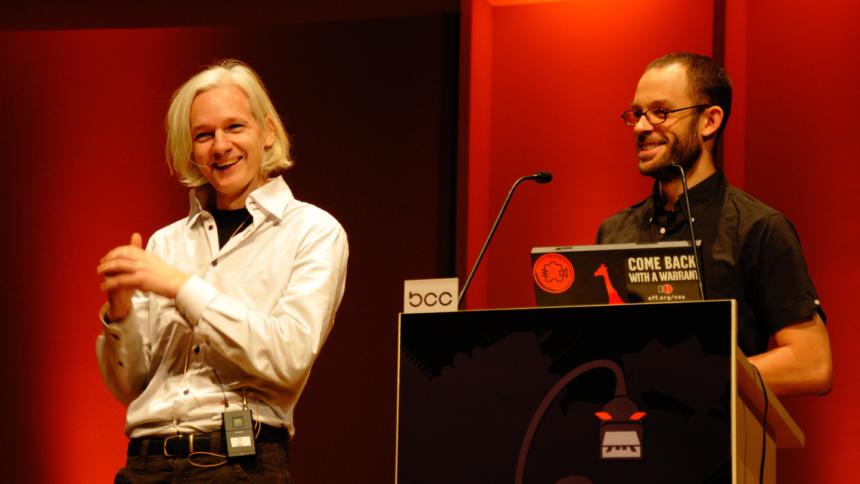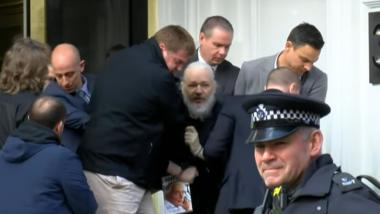This is a translation of the original German reporting and document.
Right after the London police carried Julian Assange from the Ecuadorian embassy, the United States demanded his extradition. A March 2018 indictment charges him with conspiracy to commit computer intrusion, carrying a maximum penalty of five years in prison. But that is not the entire truth.
Only one day after writing the indictment, the US Attorney’s Office admitted it was also investigating Assange for the „unauthorized receipt and dissemination of secret information“. That is what the Department of Justice wrote in a letter to former WikiLeaks spokesperson Daniel Domscheit-Berg, which we are publishing in full.
This accusation can be charged under the Espionage Act of 1917, a World War I era federal law intended to protect military secrets which has also been used to charge Chelsea Manning and Edward Snowden. Convictions under the Espionage Act can be punished by death. The death penalty is not only inhumane and archaic, it has legal consequences: The United Kingdom is not allowed to extradite Assange if he faces the death penalty.
Charging Assange for publishing classified information is an attack on press freedom, „obtaining and disseminating secret information“ is the very task of journalism. If WikiLeaks is charged, every journalist and media outlet publishing secret information will be on trial. While the Obama administration debated this dangerous precedent, the Trump government shows no restraints.
From password cracking to espionage and treason
Investigations against WikiLeaks have been running since at least their 2010 publications of the „Collateral Murder“ video and the war diaries from Afghanistan and Iraq. After they published the diplomatic cables in 2011, the Department of Justice began their own investigations.
Chelsea Manning was arrested in May 2010 and sentenced in 2013. The accusation now made against Assange was already addressed during Manning’s trial: a chat about attempting to crack a password. Obama finally commuted Manning’s remaining prison time, but the Trump administration intensified the persecution of WikiLeaks.
In Virginia, a federal grand jury is secretly investigating Assange and WikiLeaks. In December 2017, an FBI agent filed an affidavit to support charging Assange with a computer hacking conspiracy. Based on that, the grand jury issued an indictment against Assange on March 6, 2018.
This document was unsealed and published immediately after his arrest in London. It is the official justification for the extradition request. But that is not the whole story. Just one day after writing the indictment, on March 7, 2018, the same US Attorney, Tracy Doherty-McCormick, wrote a letter to the lawyers of Daniel Domscheit-Berg in Germany.
Obtaining and disseminating secret information
Sporting the Department of Justice seal, the chief federal prosecutor requests a „voluntary questioning“ of Domscheit-Berg, explicitly „about possible violations of US federal criminal law regarding the unauthorized receipt and dissemination of classified information“ – a drastic accusation under the Espionage Act.
The US Attorney goes on to explain some conditions for Domscheit-Berg. He must answer all questions fully and truthfully, the US may use all statements and information for criminal investigations and cross-examination. In return, whatever Domscheit-Berg testifies will not be used for prosecutions against him. If he violates the agreement or provides false testimony, he may be prosecuted for that. Both sides may not disclose the existence of the agreement.
Domscheit-Berg had already resigned from WikiLeaks in September 2010. But he did not cooperate with the investigators. When his lawyers requested access to the investigation proceedings, the prosecutors withdrew their offer. They did not want to disclose details of the investigations.
Five years for hacking or death penalty for journalism
In the past, more people involved with WikiLeaks were asked to support the investigations by providing information to the prosecutors. Jacob Appelbaum was asked to testify against Assange, but he refused. Manning is back in prison since early March for refusing to testify before the grand jury.
Not everyone resists. As early as 2011, several people cooperated with the FBI, including Adrian Lamo, Sigurdur Thordarson and a not publicly named „U.S. Person No. 1“. David House refused to testify before the grand jury in 2011, but changed his mind and testified in May 2018, likely after an offer similar to Domscheit-Berg’s.
The US must produce its case for requesting the extradition of Assange from Britain by June 12. In seven weeks, they must finally admit what they are trying to charge him for: hacking or journalism.
The complete letter, liberated from a PDF, translated by us:
United States Department of Justice
United States Attorney’s Office
Eastern Judicial District of Virginia
Dana J. Boente
United States Attorney’s Office
2100 Jamieson Avenue
Alexandria, VA 22314
(703) 299-3700
(703) 299-3980 (Fax)
March 7th, 2018
Subject: Daniel Domscheit-Berg
Dear attorney to Mr. Domscheit-Berg:
At the request of the United States, the German authorities have requested that your client be voluntarily questioned. This letter sets forth the terms under which your client would be heard about possible violations of United States federal criminal law regarding the unauthorized receipt and dissemination of classified information.
First, your client will answer all questions fully and truthfully and will provide all information, documents and records held or controlled by your client or to which your client has access and which are related to the subject of the interrogation.
Second, except as noted below, if the United States prosecutes your client, no statements or other information provided by you or your client during the course of the interrogation will be admissible in the government’s taking of evidence in court (case-in-chief) or in the imposition of penalties.
Third, the United States is permitted to reuse and pursue any investigative notices, statements or information that your client recommends or provides. Such derivative information may be used against your client at any time in the course of any criminal or civil proceedings. For example, if your client provides the information necessary to gain access to his electronic devices, this Agreement does not prohibit the disclosure of information obtained through a lawful search warrant on such devices.
Fourth, the United States may use such statements and information in cross-examination and rebuttal if your client appears as a witness at any stage of a civil or criminal proceeding and makes statements that differ from the statements or information provided by your client during the interrogation. In addition, the United States may use such statements and information to disprove further evidence offered or received or factual evaluations presented by or on behalf of your client that differ from the statements or information provided by your client during the interrogation.
Fifth, your client will be subject to prosecution for such violations, including, but not limited to, false testimony and obstruction of justice, if your client intentionally provides the government with false, misleading, or statements and information designed to obstruct justice. Any prosecution could be based on statements or information provided by your client during the interrogation, and the statements and information provided by your client during the interrogation could be used against your client.
Sixth, your client and the government agree that there will be no compromise negotiations or discussion of pleas at the interrogation session. However, should the hearing later be construed as a case of compromise or discussion of pleas, your client will wilfully and voluntarily waive any rights he may have under Federal Rules of Evidence 408 and 410 and Federal Rule of Criminal Procedure 11(f) that would not otherwise permit the use against your client of statements made during such negotiations or discussions.
Seventh, neither you nor your client will disclose the existence or manner of this Agreement to anyone other than your client’s family, without prior consultation of the U.S. Attorney’s Office or a court of competent jurisdiction.
Finally, the offer (proffer) to your client will be made in accordance with the agreements set forth herein. There are no promises, agreements or understandings between the parties other than those set forth in this Agreement and no amendments to this Agreement shall be effective unless signed in writing by the parties with the same formalities as in this Agreement.
If your client wishes to be heard under the conditions set out above, you and your client sign this letter as indicated below and return the original to me.
Yours sincerely
Tracy Doherty-McCormick
Acting United States Attorney
By:
Kellen S. Dwyer
Assistant United States Attorney





0 Ergänzungen
Dieser Artikel ist älter als ein Jahr, daher sind die Ergänzungen geschlossen.